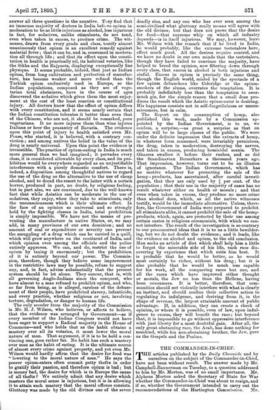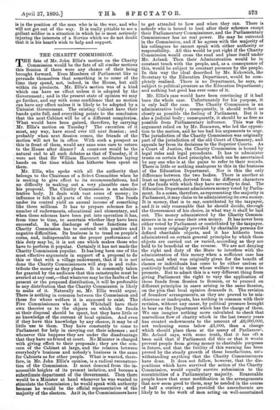THE COMMANDER-IN-CTHEF.
THE articles published by the Daily Chronicle and by ourselves on the subject of the Commander-in-Chief, have not been without result. The answer made by Mr. Campbell-Bannerman on Tuesday, to a questiOn.addressed to him by Mr. Morton, was of no small impOrtance. Mr. Alpheus Morton asked the Secretary of State for War whether the Commander-in-Chief was about to resign, and if so, whether the Government intended to carry out the recommendations of the Hartington Commission. Mr. Campbell-Bannerman replied in the following very sig- nificant words :—"I have no knowledge of any founda- tion for the rumour referred to. As to the course to be followed on the occurrence of a vacancy in the office of Commander-in-Chief, I can only repeat what I stated in this House on September 11th, 1893, that, after the recommendations made by the Royal Commission on this subject, I cannot conceive that any appointment of a permanent nature to the position of Commander-in-Chief of the Army can henceforth be made." This certainly means that on the resignation of the Duke of Cambridge we are not going to see the office filled up on the old lines; and for that, at least, the country may be thankful. What else the answer may mean it is more difficult to say. Interpretations, bad and good, may be put on it, and reasons given for believing that either interpretation is correct. Under these circum- stances, it is clearly the business of all those who care for the efficiency of the Army to see that the best and soundest, and not the worst, interpretation prevails. The meaning of the oracle remains ambiguous. It is, then, for those who realise what ought to be its meaning to assert themselves, and to insist that the oracle shall not in after years be declared to mean smooth things for persons in an exalted position.
The things which Mr. Campbell-Bannerman's answer might seem capable of meaning, but which it ought not to mean, are fairly obvious. To begin with, it might mean not that the recommendations of the Hartington Com- mission should be carried out in their true spirit, but merely that the new Commander-in-Chief should be appointed only for a term of years, and not as now, for life, or, in the official phrase, "during pleasure." But this would be an utterly useless concession. If Mr. Campbell. Bannermanmerely intended that the next Royal Duke who is made Commander-in-Chief will only hold the appointment for a fixed term of years, it is a case of " Thank you for nothing." A Royal Duke Commander- in-Chief, holding the appointment on an insecure tenure, and obliged to trim his sails to get a reappointment—that would, indeed, be a cure worse than the disease. But we do not think there is any reason to imagine that the Secretary for War meant to suggest any such course. It is much more likely that his slightly ambiguous language was an accident, and that what he intended to say in his answer was just what the words seem to mean at first sight and to the plain man. But that is that the recom- mendations of the Hartington Commission are going to be carried out, and that we are to have not a Royal Duke, holding an amphibious and anomalous office, such as is held by the Duke of Cambridge—an office which does not fit in with the essential organisation of the Army under our Parliamentary and Cabinet system, and which therefore of necessity impairs the sense of solidarity and responsibility throughout the Army and the War Office. What is wanted for the Army, just as for the Navy, and at the War Office, just as at the Admiralty, is a single responsible official head with fixity of tenure,—i.e., a man who shall not go out of office with the Government, but who shall control the Army officially, just as the Secretary to the Post Office controls the Post Office. As we have suggested before, Cabinet Ministers should, in one par- ticular at any rate, be like the gods of antiquity. Each Olympian god had his corresponding deity in the under- world. So each Cabinet Minister should have in the world of permanent officials a permanent Under-Secretary, whose functions mutatis mutandis should correspond with the functions of the Minister. We have got this in most of our great public Offices. The Postmaster-General, the President of the Board of Trade, the Colonial Secre- tary, the Foreign Secretary, have each and all an alter ego in the dim underworld of Whitehall. The sun shines on the forehead of the Cabinet Minister, but shrouded in semi-darkness and linked to him by an invisible tie is his fraternal if inferior deity. In the War Office and the Admiralty we have nearly but not quite got this system of a Cabinet Minister who is supreme and who says the final word, and below him the unchanging permanent official, who may be the alter ego of three or four Ministers, and who, subject to his chief, is head of and responsible for the Office and the Department. As we have shown on a previous occasion, the First Sea Lord of the Admiralty is not really such a person—the condominium of his colleagues prevents that—though in case of necessity he can be made to look something very like it by a bold and ingenious Parliamentarian. The Under: Secretary of State for War, though his name is so de- ceptive, is still less like the permanent alter ego of the War Secretary and the official head of the Army. In the first place, he is a civilian ; and in the next place, the organisation at the Horse Guards—i.e., the Department of the Commander-in-Chief—entirely prevents that cen- tralisation of responsibility in the hands of a single per- manent officer immediately under the Cabinet Minister, which is so essential to good administration. Now, the Hartington Commission in its recommendations in regard to the organisation of the Army went some way towards getting such an ideal officer as we have sketched,—the man who should hold towards the Army the position held towards the Post Office by the Secretary to the Post Office. The Hartington Commission recommended that the post of Commander-in-Chief should be abolished, and that instead there should be appointed a Chief of the Staff, whose business it should be to direct and superintend the affairs of the Army, subject, of course, to the authority of the Secretary of State for War and his colleagues in the Cabinet. The Report was published in the year 1889. Yet it has never been acted on. Was this because the recommendations have been impugned as impracticable, ill-judged, unworkable, or otherwise impossible to carry out ? Not a bit of it. There has been a most singular unanimity among those competent to express an opinion in regard to the recommendations of the Hartington Commission. They have been again and again supported outside and inside the Army, in the House of Commons and in the Press, as useful and beneficial. The only serious reason ever alleged for not carrying out the recommenda- tions of the Hartington Commission is the fact that to do so the post of Commander-in-Chief must be vacant, and that that post is not vacant. In plain words, the fact that the Duke of Cambridge has insisted on continuing to hold the office of Commander-in-Chief since the year 1889, the year of the Report of the Hartington Commission, has prevented the carrying-out of a reform which a body of the best and wisest men in the country declared, after weighing most carefully the testimony of the experts, was essential to the good government of the Army. It must be admitted that this fact sounds so monstrous, that it is hardly to be wondered at that the Daily Chronicle roundly attacks the Duke of Cambridge as if he were the arch-enemy of the Army. It would however, in our opinion, be far fairer to attack the system under which we allow a Royal Duke to be appointed to the command of the Army. No one but a Royal Duke could possibly have held his post for six years in face of the Report of the Commission. An ordinary man who thus stood in the way of a great reform would have certainly been called unpatriotic, and the pressure of public opinion in the Army would have forced him to resign. No ordinary General would have endured for an instant to be told that he was injuring the service. But a Royal Duke cares for none of these things,—not, however, because he is in reality indifferent to the good of the service, but because his mind is warped. If he hears any whispers of discon- tent—and it is so thankless and ungracious a task to sug- gest anything unpleasant to Royalty, that he very likely does not hear them at all—he is certain to be told by the people round him not to bother his head about these in- solent attacks, which are "merely the outcome of jealousy and of the levelling, Republican, anti-dynastic spirit so pre- valent among, &c." In this way a Royal Duke becomes im- movable, although his movement may be of the utmost moment to the country. One-half the nation does not like to press him to go, because they are afraid that in doing so they may seem to be encouraging attacks on the Royal Family, while the intervention of those who do call for his resignation is discounted as being unworthy of attention "because it is disloyal." There is no dis- guising the fact that a Royal Duke when he fills a post of such vital importance and involving so great an amount of criticism as that of Commander-in-Chief, is in a false position, and liable, like all people in a false position, to make the most grievous errors. We do not for a moment doubt that at heart the Duke of Cambridge is s perfectly patriotic man, and would certainly scorn to consider his own interests, and possibly even the interests of the Royal Family, before those of the nation. Yet, see into how deplorable a position he has allowed himself to slip ! He is in the position of the man who is in the way, and who will not get out of the way. It is really pitiable to see a gallant soldier in a situation in which he is most seriously injuring the interests of a Service which we do not doubt that it is his heart's wish to help and support.




















































 Previous page
Previous page